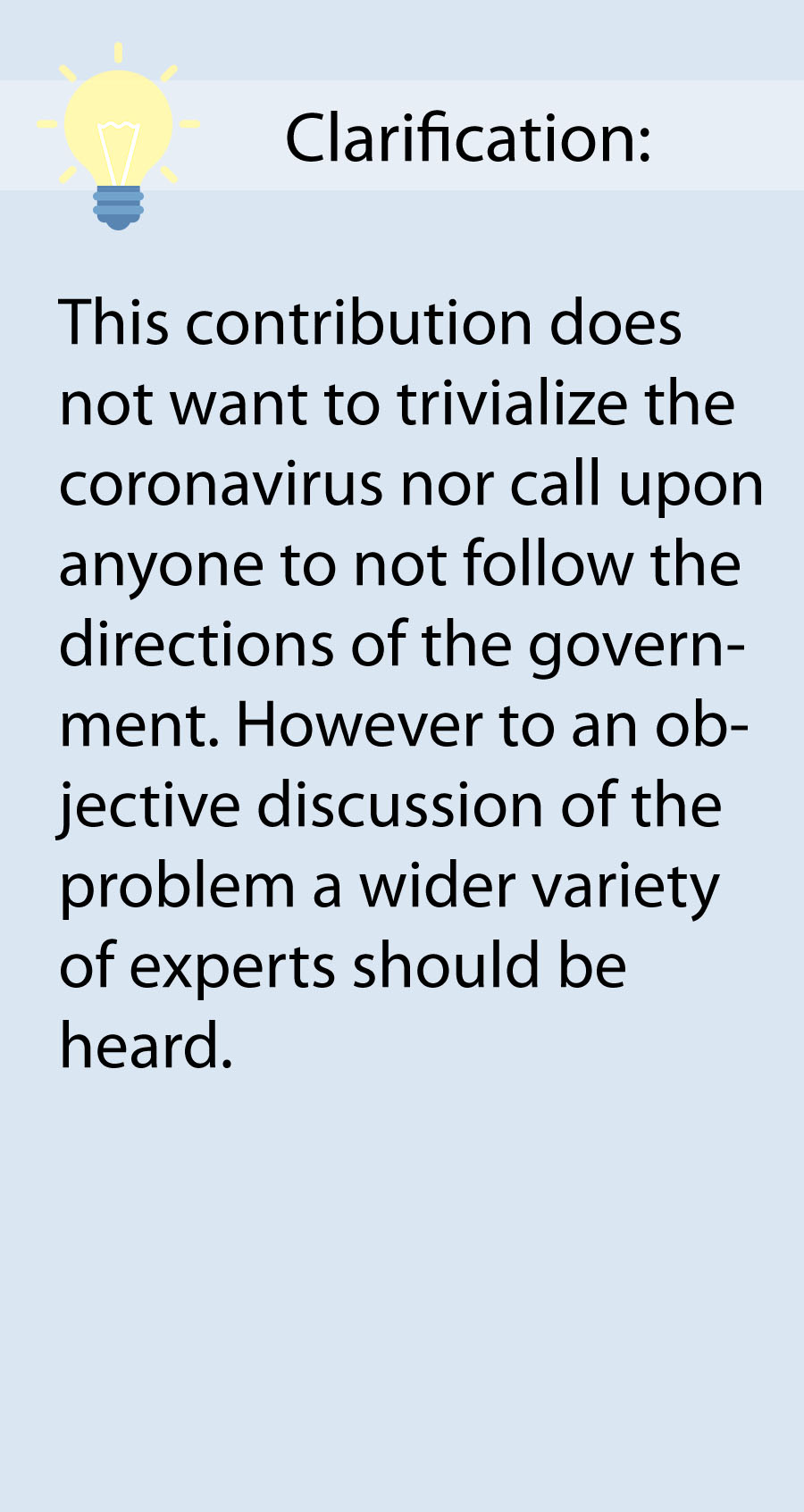Health & Medecine (English)
Coronavirus: high ranking health politician demands examination
14.04.2020
Subtitle "Afrikaans" was produced by machine.Subtitle "አማርኛ" was produced by machine.Subtitle "العربية " was produced by machine.Subtitle "Ārāmāyâ" was produced by machine.Subtitle "azərbaycan dili " was produced by machine.Subtitle "беларуская мова " was produced by machine.Подзаглавието "България" е създадено от машина.সাবটাইটেল "বাংলা " মেশিন দ্বারা তৈরি করা হয়েছিল।Subtitle "བོད་ཡིག" was produced by machine.Subtitle "босански" was produced by machine.Subtitle "català" was produced by machine.Subtitle "Cebuano" was produced by machine.Subtitle "ગુજરાતી" was produced by machine.Subtitle "corsu" was produced by machine.Podtitul "Čeština" byl vytvořen automaticky.Subtitle "Cymraeg" was produced by machine.Subtitle "Dansk" was produced by machine.Untertitel "Deutsch" wurde maschinell erzeugt.Subtitle "Untertitel" was produced by machine.Ο υπότιτλος "Ελληνικά" δημιουργήθηκε αυτόματα.Subtitle "English" was produced by machine.Subtitle "Esperanto" was produced by machine.El subtítulo "Español" se generó automáticamente.Subtitle "Eesti" was produced by machine.Subtitle "euskara" was produced by machine.Subtitle "فارسی" was produced by machine.Subtitle "Suomi" was produced by machine.Le sous-titrage "Français" a été généré automatiquement.Subtitle "Frysk" was produced by machine.Subtitle "Gaeilge" was produced by machine.Subtitle "Gàidhlig" was produced by machine.Subtitle "Galego" was produced by machine.Subtitle "Schwizerdütsch" was produced by machine.Subtitle "هَوُسَ" was produced by machine.Subtitle "Ōlelo Hawaiʻi" was produced by machine.Subtitle "עברית" was produced by machine.Subtitle "हिन्दी" was produced by machine.Subtitle "Mẹo" was produced by machine.Subtitle "Hrvatski" was produced by machine.Subtitle "Kreyòl ayisyen " was produced by machine.Subtitle "Magyar" was produced by machine.Subtitle "Հայերեն" was produced by machine.Subtitle "Bahasa Indonesia " was produced by machine.Subtitle "Asụsụ Igbo " was produced by machine.Textun"Íslenska" var framkvæmt vélrænt.Sottotitoli "Italiano" sono stati generati automaticamente.字幕は"日本語" 自動的に生成されました。Subtitle "Basa Jawa" was produced by machine.Subtitle "ქართული" was produced by machine.Subtitle "қазақ тілі " was produced by machine.Subtitle "ភាសាខ្មែរ" was produced by machine.Subtitle "ಕನ್ನಡ" was produced by machine.Subtitle "한국어" was produced by machine.Subtitle "कोंकणी語" was produced by machine.Subtitle "کوردی" was produced by machine.Subtitle "Кыргызча" was produced by machine.Subtitle " lingua latina" was produced by machine.Subtitle "Lëtzebuergesch" was produced by machine.Subtitle "Lingala" was produced by machine.Subtitle "ພາສາ" was produced by machine.Subtitle "Lietuvių" was produced by machine.Subtitle "Latviešu" was produced by machine.Subtitle "fiteny malagasy" was produced by machine.Subtitle "te reo Māori" was produced by machine.Subtitle "македонски јазик" was produced by machine.Subtitle "malayāḷaṁ" was produced by machine.Subtitle "Монгол хэл" was produced by machine.Subtitle "मराठी" was produced by machine.Subtitle "Bahasa Malaysia" was produced by machine.Subtitle "Malti" was produced by machine.Subtitle "မြန်မာစာ " was produced by machine.Subtitle "नेपाली" was produced by machine.Ondertitels "Nederlands" machinaal geproduceerd.Subtitle "Norsk" was produced by machine.Subtitle "chiCheŵa" was produced by machine.Subtitle "ਪੰਜਾਬੀ" was produced by machine.Podtytuł "Polska" został utworzony przez maszynę.Subtitle "پښتو" was produced by machine.Legenda "Português" foi gerada automaticamente.Subtitle "Română" was produced by machine.Subtitle "Язык жестов (Русский)" was produced by machine.Субтитры "Pусский" были созданы машиной.Subtitle "Kinyarwanda" was produced by machine.Subtitle "सिन्धी" was produced by machine.Subtitle "Deutschschweizer Gebärdensprache" was produced by machine.Subtitle "සිංහල" was produced by machine.Subtitle "Slovensky" was produced by machine.Subtitle "Slovenski" was produced by machine.Subtitle "gagana fa'a Samoa" was produced by machine.Subtitle "chiShona" was produced by machine.Subtitle "Soomaaliga" was produced by machine.Subtitle "Shqip" was produced by machine.Subtitle "србски" was produced by machine.Subtitle "Sesotho" was produced by machine.Subtitle "Basa Sunda" was produced by machine.Undertext "Svenska" är maskinell skapad.Subtitle "Kiswahili" was produced by machine.Subtitle "தமிழ்" was produced by machine.Subtitle "తెలుగు" was produced by machine.Subtitle "Тоҷикй" was produced by machine.Subtitle "ภาษาไทย" was produced by machine.ንኡስ ኣርእስቲ "ትግርኛ" ብማሽን እዩ ተፈሪዩ።Subtitle "Türkmençe" was produced by machine.Subtitle "Tagalog" ay nabuo sa pamamagitan ng makina.Subtitle "Türkçe" was produced by machine.Subtitle "татар теле" was produced by machine.Subtitle "Українська " was produced by machine.ذیلی عنوان "اردو" مشین کے ذریعہ تیار کیا گیا تھا۔Subtitle "Oʻzbek" was produced by machine.Phụ đề được tạo bởi máy.Subtitle "Serbšćina" was produced by machine.Subtitle "isiXhosa" was produced by machine.Subtitle "ייִדיש" was produced by machine.Subtitle "Yorùbá" was produced by machine.Subtitle "中文" was produced by machine.Subtitle "isiZulu" was produced by machine.
kla.TV accepts no liability for defective translation.kla.TV accepts no liability for defective translation.kla.TV accepts no liability for defective translation.kla.TV accepts no liability for defective translation.kla.TV accepts no liability for defective translation.kla.TV accepts no liability for defective translation.kla.TV не носи отговорност за некачествен превод.অপর্যাপ্ত অনুবাদের জন্য kla.TV কোন দায় বহন করে না।kla.TV accepts no liability for defective translation.kla.TV accepts no liability for defective translation.kla.TV accepts no liability for defective translation.kla.TV accepts no liability for defective translation.kla.TV accepts no liability for defective translation.kla.TV accepts no liability for defective translation.kla.TV nenese žádnou odpovědnost za chybné překlady.kla.TV accepts no liability for defective translation.kla.TV accepts no liability for defective translation.kla.TV übernimmt keine Haftung für mangelhafte Übersetzung.kla.TV accepts no liability for inadequate translationΗ kla.TV δεν φέρει καμία ευθύνη για ανεπαρκή μετάφραση.kla.TV accepts no liability for defective translation.kla.TV accepts no liability for defective translation.kla.TV no se hace responsable de traducciones incorrectas.kla.TV accepts no liability for defective translation.kla.TV accepts no liability for defective translation.kla.TV accepts no liability for defective translation.kla.TV accepts no liability for defective translation.kla.TV n'assume aucune responsabilité en cas de mauvaise traduction.kla.TV accepts no liability for defective translation.kla.TV accepts no liability for defective translation.kla.TV accepts no liability for defective translation.kla.TV accepts no liability for defective translation.kla.TV accepts no liability for defective translation.kla.TV accepts no liability for defective translation.kla.TV accepts no liability for defective translation.kla.TV accepts no liability for defective translation.kla.TV accepts no liability for defective translation.kla.TV accepts no liability for defective translation.kla.TV accepts no liability for defective translation.kla.TV accepts no liability for defective translation.kla.TV nem vállal felelősséget a hibás fordításértkla.TV accepts no liability for defective translation.kla.TV accepts no liability for defective translation.kla.TV accepts no liability for defective translation.kla.TV tekur enga ábyrgð á áræðanleika þýðingarinnarKla.TV non si assume alcuna responsabilità per traduzioni lacunose e/o errate.Kla.TV は、不適切な翻訳に対して一切の責任を負いません。kla.TV accepts no liability for defective translation.kla.TV accepts no liability for defective translation.kla.TV accepts no liability for defective translation.kla.TV accepts no liability for defective translation.kla.TV accepts no liability for defective translation.kla.TV accepts no liability for defective translation.kla.TV accepts no liability for defective translation.kla.TV accepts no liability for defective translation.kla.TV accepts no liability for defective translation.kla.TV accepts no liability for defective translation.kla.TV accepts no liability for defective translation.kla.TV accepts no liability for defective translation.kla.TV accepts no liability for defective translation.kla.TV accepts no liability for defective translation.kla.TV accepts no liability for defective translation.kla.TV accepts no liability for defective translation.kla.TV accepts no liability for defective translation.kla.TV accepts no liability for defective translation.kla.TV accepts no liability for defective translation.kla.TV accepts no liability for defective translation.kla.TV accepts no liability for defective translation.kla.TV accepts no liability for defective translation.kla.TV accepts no liability for defective translation.kla.TV accepts no liability for defective translation.kla.TV accepts no liability for defective translation.kla.TV aanvaardt geen aansprakelijkheid voor foutieve vertalingen.kla.TV accepts no liability for defective translation.kla.TV accepts no liability for defective translation.kla.TV accepts no liability for defective translation.kla.TV nie ponosi odpowiedzialności za wadliwe tłumaczenie.kla.TV accepts no liability for defective translation.kla.TV não se responsabiliza por traduções defeituosas.kla.TV accepts no liability for defective translation.kla.TV accepts no liability for defective translation.kla.TV не несет ответственности за некачественный перевод.kla.TV accepts no liability for defective translation.kla.TV accepts no liability for defective translation.kla.TV accepts no liability for defective translation.kla.TV accepts no liability for defective translation.kla.TV accepts no liability for defective translation.kla.TV accepts no liability for defective translation.kla.TV accepts no liability for defective translation.kla.TV accepts no liability for defective translation.kla.TV accepts no liability for defective translation.kla.TV nuk mban asnjë përgjegjësi për përkthime joadekuate.kla.TV accepts no liability for defective translation.kla.TV accepts no liability for defective translation.kla.TV accepts no liability for defective translation.Kla.TV tar inget ansvar för felaktiga översättningar.kla.TV accepts no liability for defective translation.kla.TV accepts no liability for defective translation.kla.TV accepts no liability for defective translation.kla.TV accepts no liability for defective translation.kla.TV accepts no liability for defective translation.kla.TV ንዝኾነ ጉድለት ትርጉም ዝኾነ ይኹን ሓላፍነት ኣይቅበልን እዩ።kla.TV accepts no liability for defective translation.kla. Walang pananagutan ang TV sa mga depektibong pagsasalin.kla.TV accepts no liability for defective translation.kla.TV accepts no liability for defective translation.kla.TV accepts no liability for defective translation.kla.TV عیب دار ترجمہ کے لیے کوئی ذمہ داری قبول نہیں کرتا ہے۔kla.TV accepts no liability for defective translation.Kla. TV không chịu trách nhiệm về bản dịch không đầy đủ.kla.TV accepts no liability for defective translation.kla.TV accepts no liability for defective translation.kla.TV accepts no liability for defective translation.kla.TV accepts no liability for defective translation.kla.TV accepts no liability for defective translation.kla.TV accepts no liability for defective translation.
This is a modal window.
The media could not be loaded, either because the server or network failed or because the format is not supported.
Coronavirus: high ranking health politician demands examination
14.04.2020
www.kla.tv/16136
The high-ranking health politician and lung specialist Dr. Wolfgang Wodarg evaluates the measures used to combat the coronavirus as unjustified and depriving people of their freedom. In an interview with the Internet platform punkt.preradovic, he calls for a committee of inquiry into this matter, among other things. He explains why, in the following interview which Eva Herman conducted with Dr. Wodarg on this topic.
[continue reading]
Coronavirus: high ranking health politician demands examination
Download broadcast and attachments in the wanted quality:
Useage rights:
Standard-Kla.TV-Licence
Coronavirus: high ranking health politician ...
My eye-removal appointment - how pharma and ...
Coronavirus - A respiratory illness like every ...
The corona virus test - a pseudo-scientific ...
The Coronavirus: “a coincidence” or ...
Damages greater than benefits with currently ...
Cancer through chemotherapy? ...
Telephone interview with microwave specialist ...
Telephone interview with microwave specialist ...
Peter König: Corona virus - a means to ...
Worldwide epidemics of chronic diseases ...
Mobile Communication in “good” company with ...
Wireless lobby faces trial in the USA – ...
Japan Leads the Way: No Vaccine Mandates and ...
Criminal health care goals ...
Harmful Mobile Radiation – how threshold ...
The shaky foundation of the fathers of ...
Last stronghold of independent medical science ...
Vaccination illusion: Measles vaccination and ...
Vaccine industry: profit security over vaccine ...
Censored - The movie “VAXXED - From Cover-up ...
Mobile Communication - the hidden danger ...
Mandatory vaccination ...
WHO remains silent about relation between ...
Trending on Kla.TV











1
www.kla.tv/36960 8:22 Tko kontrolira hranu, kontrolira ljude

2
www.kla.tv/37057 1:01:46 Biblija – Sveto pismo ili židovska knjiga zavjere?

3
www.kla.tv/23567 5:28 Optogenetika - planirani put do potpune kontrole naših mozgova?

4
www.kla.tv/37374 34:08 Zar postojanje virusa i infekcija nije dokazano? Intervju s Marvinom Haberlandom iz Next Level

5
www.kla.tv/37393 6:18 “Trebao bi postati zaposlenik UN-a” – satirično ozbiljno

6
www.kla.tv/37017 4:38 Mediji šute: Oštećenje oralne sluznice zračenjem mobitela!

7
www.kla.tv/37333 9:30 Politika žrtvuje Njemačku proizvođačima oružja i velikim bankama

8
www.kla.tv/24522 2:45 "Pametni grad": Ne posjedovati ništa i biti sretan?

9
www.kla.tv/37224 27:00 Zločin protiv čovječanstva: Nove injekcije gena-mRNA za sve

10
www.kla.tv/37501 1:17 Klonite se mirovinskog fonda


















 Deutsch-ID setzten
Deutsch-ID setzten



Sendungstext
herunterladen
14.04.2020 | www.kla.tv/16136
Dr. Wolfgang Wodarg, MD, is a lung specialist, who worked many years in the public health sector, in the fields of epidemiology and health economics, hygiene and environmental medicine. as well as lecturing at various universities and academies. In 1991 he received a fellowship for epidemiology and Health economics from the John Hopkins University, in Baltimore, USA As member of the German Parliament (Bundestag), from 1994-2009, he was initiator and spokesperson for the Enquete Commission* “Ethics and Law of Modern Medicine”. He was also a member of the Parliamentary Assembly of the Council of Europe as Chairman of the Subcommittee on Health. In 2009, in Strasbourg, he initiated the committee of inquiry into the role of the WHO in H1N1 - swine flu. After leaving parliament he continued there as a scientific expert. Since 2011 he works as a freelance university lecturer, doctor and health scientist. He is an honorary board member of Transparency International, Germany. Dr. Wodarg has given various interviews conerning the Coronavirus. On the Internet platform Punkt.Preradovic he spoke about the negligent coronavirus containment measures. These would restrict not only people’s freedom, but also their ability to work. He called for a committee of inquiry in the German parliament and addressed lawyers to stop the coercive measures already ordered. He appealed to the epidemiologists to finally break their silence in order to allow a differentiated and above all unexcited view of the current situation. He recently gave another very informative interview on this subject to Eva Herman. Watch this interview here! Interview with Dr. med. Wolfgang Wodarg : Eva Herman: Hello, good afternoon, ladies and gentlemen. We have a big corona fever worldwide. And there is a lot of panic, a lot of unrest on this earth at the moment. Not only in Germany, but practically everywhere. There are a lot of reports that are scaring people. So it's all the more important to hear dissenting voices - counter-voices, which as a matter of fact have a calming effect at first, at least as far as the virus is concerned. As far as all the worldwide side-effects are concerned, there will still be many more consequences that will continue to keep us in suspense. I would like to give a hearty welcome to Dr. Wolfgang Wodarg - joining us today - not in the studio - but via Skype from Greece. Hello, Dr Wodarg! Dr. Wodarg: Hello, good day! Eva Herman: Dr. Wodarg, you have a very long resumé, you are a lung specialist and epidemic expert. You have worked for many years at various academies, for public health and occupational medicine in Berlin. You have worked mainly in the fields of epidemiology and health economics for many years. Above all, you also recieved a scholarship for these specialized fields at the renowned Johns Hopkins University in Baltimore. You have been a ship's doctor, port doctor. You have specialist qualifications, additional designations in internal medicine, hygiene and environmental medicine. You have been a medical officer for many years, lecturer at universities and colleges. I say all this so that the audience also knows that as an expert you cannot simply be brushed aside. You have also been politically active for a long time. As an SPD politician you were member of the German Parliament - the Bundestag - and you were also in the European Parliament. Again and again the topics addressed were ethics, health and hygiene. And what is happening right now; we see a lot of panic in the world. Do you think that what is happening is ethically right and proper? Or, what is your view on this very panic-filled debate at the moment? Dr. Wodarg: I must correct one thing though. I was not in the European Parliament. I was in the Parliamentary Assembly of the Council of Europe. And that was also where we did the investigation on swine flu. That was also a hype. Probably many will still remember how fear was spread there - and how we were told that we should all be vaccinated. It was quite easy to see that there were big lobbyists who were trying to sell the vaccine. Huge deals were made, with unnecessary and harmful vaccines, in fact. What we are seeing now: it started in China. And if I may say so, once again it has been instigated by virologist -virologists who have sounded the alarm. Virologists are people who care about very, very small creatures. Very, very small particles. There are many, many different ones and they multiply enormously. These viruses make us sick too, every year. There's the flu epidemic that we all know about. And in my medical practice, when I ask my patients: “Have you already had a flu this year?” Then some of them also say: “Yes, yes already twice.” That means that every year it is normal that people with or without fever, then somehow have pain in the upper bronchia, or a bad runny nose, or a sore throat, or some have a cough or get bronchitis. Some people also get pneumonia. This happens, especially if you are weakened. And what we have experienced now, what was going on in China, we watched it here from here in Europe and we didn't really notice that it was somehow special for us. There were not more cases than usual. There is this regular monitoring of acute respiratory sicknesses. There are a lot of medical practices involved in this. They report every week whether there are more or less cases. And this year it's been quite normal. Overall, there are no more or no fewer cases than in previous years. Eva Herman: Yes...Maybe it is... maybe the reason that the numbers are not so high - is because they all fall under the corona virus now, because they all have similar symptoms. Is that possible? Dr. Wodarg: These are acute respiratory illnesses. And all the pathogens that cause this, are involved. The corona viruses have always been involved in this, with five to fifteen percent, we can calculate - corona viruses have always been responsible for our flu. Usually it is not just one type of virus alone, but usually two or three that take advantage of this and then multiply. Corona viruses are often socially interactive and make us sick together with other viruses . If you only look at the corona viruses and only have the test for this one type, then of course you cannot judge the others. And in the end you cannot say which viruses were worse and which caused more symptoms. Eva Herman: But it is now being made very clear. First it was called the novel corona virus and now it is being called Covid19. It has was given another name. Did they seperate it out of this general corona virus family like that? Is it a different one or can it not be distinguished at all? Dr. Wodarg: You know; you have to imagine you have the following situation: I want to explain it with a very simple example. You have a very large road with a lot of cars. So they drive back and forth in four lanes or six lanes - back and forth. And you close your eyes and let a thousand people cross the road blindfolded. That is dangerous. And let's just say 100 people will die in traffic. And you count that and then you measure it every year or every time you try to do this text again, so and so many more will die. It's a bit like the flu, too. It is dangerous during this specific time of year. But so far we have never bothered about whether these people are run over by trucks, by motorcycles, by cars, by station wagons and by which type of car. This is what we are doing about viruses now. It is dangerous in the cold season. And there are many viruses, different ones, just as there are different cars on this dangerous road, which you should not walk over. And there it doesn't really matter, because if there is more room for one type of virus or if we would take away one type of virus by vaccination, as we do with influenza, then we have seen that there is more room for the other viruses. And then the danger is not changed, it remains the same. In other words, it is not necessary and it distracts us tremendously from much more important measures if we take care of the individual virus types now. That's what the virologists do, they live on it. And then they make vaccines and want to sell them. They do tests and make money from them and they are important. But in the end it does not change the overall frequency of the viral illnsesses. And you can see that from the sentinel practices on the one hand. You can also see it in the deaths. It's true, the flu is dangerous, no matter which of the viruses attack us. Every time, every year in every season, more people die in the flu season than in the summer, for example. There's a wave like this every time. And this higher mortality rate is not greater this year than in previous years. Even if you look, what is it like in China? You do not see more cases (than usual) and even though the alarm cry was raised in China. Nothing more has happened. And in Italy, which they are making so much noise about now, the mortality rate last week and the week before that was no higher, but rather lower than in previous years. There are very specific indicators, which are very solid indicators. You know exactly what is being measured. The same is measured every year. And you can also use them to compare whether there will be more this year. And these indicators show that it won't be more this year. Eva Herman: In other words, you say the indicators show that there will not be more this year. Does that include the officially reported cases of corona virus - of those infected and also of those who have died? Dr. Wodarg: You know, the proportion of the influenza viruses that are measured compared to the corona viruses that are measured is about one to twenty here in Germany. That means one part corona virus and twenty parts influenza. But the only reason for this is because influenza is measured more. What we are currently observing is not the number of flu cases or the amount of corona involvement in this flu. What we measure is the number of tests, how many tests we do. And then, of course, whenever we test, there are always corona viruses present too. And these are no different results than would actually be expected. We know that there are five to fifteen percent corona viruses present. And if we test a hundred times, then we have fifteen cases. And if we test 1,000 times, then we have 150 cases, and if we test 10,000 times, then we have the corresponding number. That means, the more often we test, the more corona viruses we find, of course. And that is what we are counting and getting very excited about. But we have never counted this in the past. Eva Herman: But nevertheless it is true. Mrs. Merkel, the German Chancellor, said completely unemotionally, almost incidentally, that 60 to 70 percent of German citizens would be infected by this corona virus. That would of course be a bit much for a normal influenza. Wouldn't it? Dr. Wodarg: No, that's simply like this: regularly - in this wave of influenza - it is always counted what percent of the population have fallen ill this week? And sometimes that's five, sometimes three, sometimes eight percent, who have gotten sick in this very week. If you ask your friends and acquaintances, you’ll hear, oh, I've got it and I've just caught it ... That's around five percent, up to eight percent sometimes in the big wave. And when a flu lasts three weeks, you've already got three times eight percent, because new cases come in every week. That means that in a flu season you have at least about 50% of the population who have had the flu once. If you ask around, how often did you have the flu last year? Most people say once or twice. And some say, not at all this year. It varies a lot and that's why it happens that in one flu season 70 percent of the population gets the flu, often with fever and unpleasant symptoms, coughing and all that. But that happens every year. And there are always corona viruse present, up to fifteen percent. So when the Chancellor now says, oh we can - we must expect that this year 70 percent of the population will also have corona viruses. Well, that has always been the case, Chancellor, there is no need to get upset. Eva Herman: Of course, I am relieved to hear that. The next question is, however, when we see the many panic photos from China in January and February, which have worried us all here very much - and the whole thing is continuing in Italy as well, completely overstrained and overworked medical staff. I’ve heard that in Spain the same is happening - so we are getting a lot of reports here about this. Is all this now due to a certain panic that has been triggered - that there are so many people running to the doctor now? Dr. Wodarg: Slowly, there are also other reasons for that. You know, now a big company, Rosch, is getting approval for a test and is happy to make millions of tests available. These tests are completely unnecessary, but Rosch will certainly want to sell them and they will certainly make sure that the panic remains so that people can test themselves. So there are dynamics that then lead to the whole thing being amplified. There are interests behind it. A virologist is of course important, he wants to have money for his institute, he wants to stay in the limelight and he also wants to be very important as advisor to the Chancellor. He can also. But that's not enough. It's something where you have to take a more holistic view of what's happening in the population. And that is missing terribly. There are not enough people who are normally concerned with the frequency of diseases, who can compare it, who can relate it to normal values, so that you can say that there is something really special or this we know - we see every year. And that's what I miss tremendously now. And I ask myself all the time, who is it that feeds this hype all the time and all the time, who benefits from this? What's all this about? People are no more ill and no more seriously ill than all the years before. Eva Herman: But... what I do wonder about, in light of all these developments, is that there definitely were some reports published, - the Epoch Times for example, which reported quite factually. At least that is our observation. And they had reported that in China the crematoria were working twenty-four-seven, that is twenty-four hours, seven days a week, and had to hire new staff. They even set up mobile crematoria. What did they burn, if not an excessive number of people who are no longer there - who must have died? Dr. Wodarg: I would just have to check here but, you have alone in Hubei province, where Wuhan is located - you have to reckon with 150,000 pneumonia deaths per year there alone - 150,000 people dying of pneumonia. If you have a crematorium there, it has a lot to do simply with these and they make up about 10-12% of the dead. That means, if you have 50 million people in Hubei, then if the average life expectancy is 80 or 100 years, some die - som of them die, not quite a million, but 800,000 or so a year probably die. So the crematorium is always busy, but no one has taken this into account. Nowdays you can make great films and scare people with them. And it's the same with ... well, most of the questions I get, about why there is such a chaos and why there is such an emergency situation in the hospitals in Italy? You know that in Italy, for example, Italy has a very, very cirtical situation regarding antibiotic resistance. In Italy, there is antibiotic resistance in 26% of cases, and in Germany in 0.5% of all cases. In other words, it is more dangerous in Italy anyway. Nosocomial infections, i.e. infections which you only acquire in hospital because the germs are more common in hospital - there are all the patients who bring these germs with them - are very, very high. To go into a hospital when you are ill is very, very dangerous. And the Italians - I have been told - are very afraid of their hospitals. There is probably a lot to do. A lot more staff is needed there, a lot more resources have to go there, there has to be much better hygiene. And I think that the doctors there, that they are happy that they are finally getting some attention, so that more resources are finally put into this health care in Italy. I wish them the same. But there are not more dead in Italy than usual. Eva Herman: Okay. Do you think - and I want to repeat the question briefly - do you think that all this hype in Europe is due to the fact that many people, even older - even old people, are now in panic, who may have pre-existing illnesses and now quickly run to the doctor, run to the clinic and then, of course that makes the whole thing worse? Dr. Wodarg: Of course, you can do something good for the population through these measures, which are now part of all these attempts. An incredible amount has been changed. People are informed, they are also misinformed, they get scared and then go to the doctor or seek medical help. This of course also causes bottlenecks and emergencies in the hospitals. And as a result, people who do not really need it may go more often to the doctor because they are afraid. What additional factors play a role when you start counting, what is the supply situation and how does it change when people hamster disinfectants? Of course they need disinfectants, although I wonder why they don't just use normal industrial alcohol, it also has a good disinfectant effect and is very easy to produce. So from that point of view, there should not really be any bottlenecks. Eva Herman: Oh, tell us - tell us very briefly how it is produced, because otherwise we will be flooded with questions. Dr. Wodarg: Alcohol? Eva Herman: Yes Dr. Wodarg: In my home town of Flensburg there is a brewery, the Flensburger Brewery, and the Flensburger Brewery, also produces non-alcoholic beer. And they do this by brewing normal beer and then simply extracting the alcohol chemically. Then they sell the pure alcohol to the industry. That is of course suitable alcohol. Wherever non-alcoholic beer is produced, they also get pure alcohol for disinfection, for example. Eva Herman: Isopropyl or something like that, yes. I can remember a program that we broadcast a few years ago, when you were on the executive board of Transparency International - please tell us a little bit about this organization - and you revealed that in the course of the swine flu epidemic, even before the swine flu was declared, lobbyists from the highest political levels in France and other countries had had factories built that produced a vaccine against swine flu. Dr. Wodarg: Yes, I researched that very thoroughly. At that time it was only the bird flu, in about 2005, and that was the reason - SARS was even earlier - that the World Health Authority was practically faced with the task of making such plans for what they called pandemics, i.e. that a certain pathogen spreads around the world and makes people very, very sick and many die, that it creates an emergency situation. At that time, these plans were made and the big vaccine manufacturers then signed contracts with the individual nations, and if such a pandemic was declared by the WHO, they would produce the vaccine then very quickly. They would build extra factories for it and then it would happen very quickly. Of course, they have also had the state finance these preparations. They got a lot of money, but when there was no real serious wave, no real pandemic, then they made one and created a crazy hype, so that people were terrified and the WHO joined in on this. The WHO then declared a pandemic. It declared the pandemic due to simple mathematical models. It simply said: "Oh, there is a new pathogen!” - a new pathogen, supposedly - although it was not new at all - a new pathogen and this pathogen, it could be quite dangerous. And it spreads very, very quickly. That it was already detectable everywhere in people, that even many people already had antibodies against it, this was finally admitted, afterwards. It was a huge panic at the time, and this panic was created so that the WHO could then say: "Oh, now the pandemic is here!” And in order for them to be able to say that, they had to remove two criteria for emergencies: that they were very serious illnesses - they were not then - and that very many people were dying. They simply deleted that from the definition. And then the pandemic was there. Then all that was said was: a new pathogen! It spreads all over the world! And it does this every year. Eva Herman: So that means, the new pathogen, it doesn't have to be dangerous. Pandemic already means that the thing is spreading all over the world, so then all the emergency measures are already put into place. Dr. Wodarg: We already said this at the time in the Council of Europe in Strasbourg, and it was already clear. Everybody was amazed at what the WHO was saying, because if it only has to be a new pathogen that spreads worldwide, then we have a pandemic every year, because that's what viruses do. Viruses have to change all the time. Viruses are always new, because the viruses that already exist, that we have, that we already got to know last year, they can't make us sick so much anymore, because we are already immune to them. That means the viruses must always, always change. There are new virus subtypes every year and they spread all over the world. This means. every year new viruses spread all over the world. Eva Herman: Dr. Wodarg, excuse me, please! I hope that we can get the whole recording in the box. That's why I'm putting a little bit of time pressure on us. Please exuse that. Dr. Wodarg: Yes, yes. Eva Herman: We have different conditions now though, we have a worldwide restriction of freedom. People are locked up in cities, businesses are closed down, the financial system and the global monetary system are on the verge of collapse or already are in free fall. In other words, these measures here, they are even more far-reaching than has ever been the case. I want to come back to one thing. You say that the WHO has simply changed the wording, the definition of a pandemic, which is still the case today. At the same time, when this corona virus broke out in January, China was the first country where this corona virus was officially identified, and then China - the Chinese Communist Government - approached the WHO relatively quickly and said that we now had an emergency, to which the WHO reacted relatively quickly. And it was precisely this pandemic - well that took some time - but the panic-mongering was under way. Now we know - anyone can determine with a bit of research - that the WHO is financed by countries such as China, but also by "vaccination specialists", people who are interested in vaccines, who invest a lot of money in them and do research, such as the Bill & Melinda Gates Foundation, which also... did this test scenario - the exercise 201 in New York on October 18th, 2019, where a corona virus pandemic exercise took place. And, as I said, Bill Gates also finances the WHO with very large sums of money. Do you see any connection of interest there? Dr. Wodarg: Yes, these funds are mostly earmarked and that's not right. That means that if someone invests in the WHO, he has certain expectations and influences what is done there, he influences the filling of the positions that are assigned there. And there are very strong conflicts of interest that arise because the countries - the national states - simply do not give enough money of their own accord, to keep the WHO working and to make it workable. Without these industrial funds and without these foundation funds and without the voluntary funds that some states give because they want to use them to promote their own health economy the WHO would not function. Some countries function like a money-laundering machine for industry when it comes to funding the WHO. In other words, these are all "misappropriated" funds. These are funds, ear-marked for specific projects and that is the trouble, because it always leads to these conflicts of interest. The WHO is not free to see where the need is greatest, to see where they have to take care of something! The WHO takes care of what it gets money for and that is the difficulty. Eva Herman: Yes. I had a ZEIT article on my desk the other day - ZEIT is a politically correct media organ, which had headlined that Bill Gates is the secret boss of the WHO. So there are indications that the so-called "mainstream" also know how all this background information that you provide us here could be and must be known already in the so-called mainstream. How do you think our government politicians - the Ministry of Health, for example or the Federal Government - are informed about the background information you are giving us here? Dr. Wodarg: Yes, you know, that is very, very difficult. Think of the many ... think of the bank scandals, think of the VW scandal, think of all these things. Unfortunately ... we have to realize that we can no longer rely on many institutions on which we are actually dependant - that a great many external influences play a role. At Transparency we talk about institutional corruption. In other words, the institutions no longer really see what they are actually there for - primarily, but must obey other things. This may be economic interests which they obey, but there is also political influence. If you think of more absolutist countries, or countries where there is an authoritarian government, they instrumentalize and use their offices and institutions according to their will. If an authoritarian state, such as China, now suddenly says: we no longer want to do these tests, then they suddenly have no more corona cases. China is now doing these tests mostly at the border and says the corona cases that are all coming now - are coming from abroad. Imagine that, in a country of 1.4 billion, only 40 cases are reported daily. It's downright ridiculous. Before this, there were also only few cases, because there were not so many tests available and the more tests you had, the more the number of cases increased. Then you saw all these efforts, you saw all these wrapped up people everywhere or the streets empty. You just have to stop testing. Then you can say we've had a tremendous success, because nobody is found ill. So this is a question that you will certainly have to answer later, how many tests have been done and how many cases have been found in the individual countries. What was the measurement strategy, in the first place? It is all completely obscure. Eva Herman: That's why - excuse me - we also still have so few cases, until now in Africa. Dr. Wodarg, thank you very much, but unfortunately we have to stop because the line is no longer available to us. Thank you very much, we will continue to spread this information and hope that with it the population will be reassured again, to a certain extent. Thank you again, very much. Dr. Wodarg: You are welcome! There is no need to fear - absolutely no need to be afraid. Eva Herman: Thank you. Good-bye.
from H./ah.
https://www.youtube.com/watch?v=va-3zS9q1yo
https://kenfm.de/tagesdosis-19-3-2020-corona-krise-wir-befinden-uns-im-krieg/
https://www.wodarg.com/q-a-fragen-und-antworten-zu-corona/